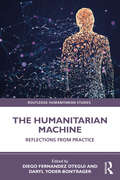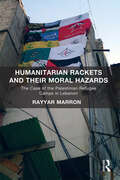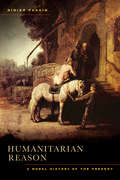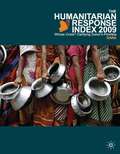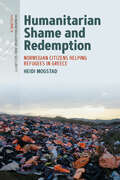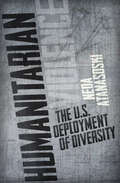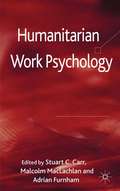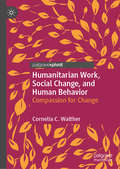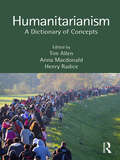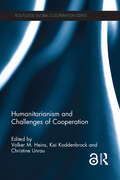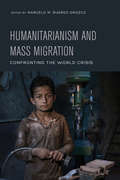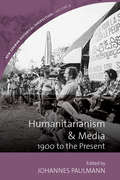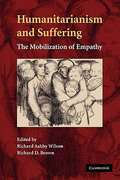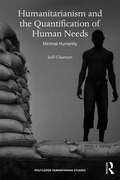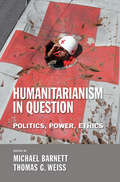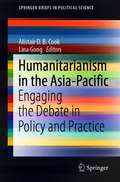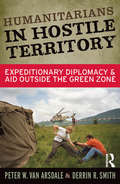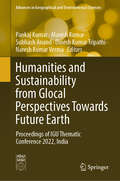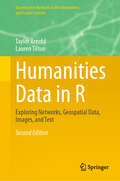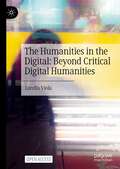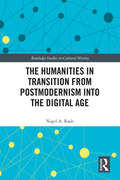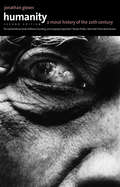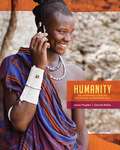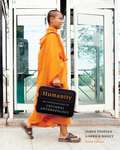- Table View
- List View
The Humanitarian Machine: Reflections from Practice (Routledge Humanitarian Studies)
by Diego Fernandez OteguiAs the world reels from the impact of a global pandemic and increasing intensity of climate-caused hazards, the humanitarian sector has never been more relevant. But providing aid to those affected by disasters and crises is more complex than ever. In The Humanitarian Machine aid workers reflect on their own experiences of working in crisis. As they write about their work and the ways in which they each approach the challenges of helping people, they comment on some of the most vexing issues facing the humanitarian sector. Each speaks from their own perspective, asking tough questions, sharing thoughtful reflections about their ongoing work, and unpacking what it really means to be a humanitarian worker. The stories they tell, whether recounting a specific experience or reflecting on years of practice, reveal the dilemmas they face and demystify the overly romanticized aura that sometimes surrounds humanitarian practice. Complementing the candid accounts that humanitarian leaders contribute in this book, the editors examine how their stories, perceptions, and understandings align with similar conversations that take place in other settings. Viewed together in this way, the insights and reflections provided in this book will be invaluable for humanitarian practitioners, students, and researchers alike.
Humanitarian Photography
by Heide Fehrenbach Davide RodognoFor well over a century, humanitarians and their organizations have used photographic imagery and the latest media technologies to raise public awareness and funds to alleviate human suffering. This volume examines the historical evolution of what we today call "humanitarian photography" - the mobilization of photography in the service of humanitarian initiatives across state boundaries - and asks how we can account for the shift from the fitful and debated use of photography for humanitarian purposes in the late nineteenth century to our current situation in which photographers market themselves as "humanitarian photographers." This book is the first to investigate how humanitarian photography emerged and how it operated in diverse political, institutional, and social contexts, bringing together more than a dozen scholars working on the history of humanitarianism, international organizations and nongovernmental organizations, and visual culture in Africa, Asia, the Middle East, Europe, and the United States. Based on original archival research and informed by current historical and theoretical approaches, the chapters explore the history of the mobilization of images and emotions in the globalization of humanitarian agendas up to the present.
Humanitarian Rackets and their Moral Hazards: The Case of the Palestinian Refugee Camps in Lebanon
by Rayyar MarronThe humanitarian crisis in the Palestinian refugee camps of Lebanon has become one of the most populist causes in the world, yet the causes of the crisis have been misrepresented, whilst on-going humanitarian assistance could arguably be said to amplify problems that exist in the camps. Shedding light on the disturbing occurrence of corruption, rent-seeking and racketeering, together with the emergence of zones of privatised territory based on self-enrichment, this book challenges the conception of refugees in camps as helpless, vulnerable individuals. Based on detailed and sustained research at the camp of Shatila in Beirut, Humanitarian Rackets and their Moral Hazards reveals that even the access of humanitarian agencies to the camp is determined by payment to certain refugee groups, whilst the degree of humanitarian interaction has created a sense of entitlement amongst some, based on a belief in their own exceptionalism as a displaced ethnic group. Detailing the everyday economic transactions that transpire in refugee camps, this book shows that, far from being helpless victims with no power over their circumstances, many Palestinian refugees have created lucrative ventures from humanitarian assistance. A rich, yet troubling study of refugee life and the 'cartelisation' of camp space, this book will be of interest to sociologists, anthropologists and political scientists working in the fields of humanitarian intervention, development, criminology and informal economies.
Humanitarian Reason: A Moral History of the Present
by Didier FassinIn the face of the world's disorders, moral concerns have provided a powerful ground for developing international as well as local policies. Didier Fassin draws on case materials from France, South Africa, Venezuela, and Palestine to explore the meaning of humanitarianism in the contexts of immigration and asylum, disease and poverty, disaster and war. He traces and analyzes recent shifts in moral and political discourse and practices -- what he terms "humanitarian reason"-- and shows in vivid examples how humanitarianism is confronted by inequality and violence. Deftly illuminating the tensions and contradictions in humanitarian government, he reveals the ambiguities confronting states and organizations as they struggle to deal with the intolerable. His critique of humanitarian reason, respectful of the participants involved but lucid about the stakes they disregard, offers theoretical and empirical foundations for a political and moral anthropology.
The Humanitarian Response Index 2009
by DaraOver 350 million people are affected each year by disaster and conflict. The international community is often unable to respond effectively to these crises. This report provides an independent examination of donor performance with the aim of improving the effectiveness of aid, and promoting greater accountability of donors.
Humanitarian Shame and Redemption: Norwegian Citizens Helping Refugees in Greece (Humanitarianism and Security #4)
by Heidi MogstadFollowing the 2015 ‘refugee crisis,’ many different actors emerged to contest or mitigate the EU’s border policies. This book explores the birth and trajectory of a Norwegian volunteer organisation “A Drop in the Ocean”, established by a mother of five with no prior experience in humanitarian work. Drawing on eighteen months of ethnographic fieldwork, Heidi Mogstad examines the organisation’s shifting and contested efforts to ‘fill humanitarian gaps’ in Greece while witnessing and shaming the Norwegian public and politicians into action. Moving beyond existing critiques of humanitarian sentiments like pity and compassion, the book focuses specifically on the work of shame and other ‘negative’ emotions.
Humanitarian Violence: The U.S. Deployment of Diversity (Difference Incorporated)
by Neda AtanasoskiWhen is a war not a war? When it is undertaken in the name of democracy, against the forces of racism, sexism, and religious and political persecution? This is the new world of warfare that Neda Atanasoski observes in Humanitarian Violence, different in name from the old imperialism but not so different in kind. In particular, she considers U.S. militarism—humanitarian militarism—during the Vietnam War, the Soviet-Afghan War, and the 1990s wars of secession in the former Yugoslavia.What this book brings to light—through novels, travel narratives, photojournalism, films, news media, and political rhetoric—is in fact a system of postsocialist imperialism based on humanitarian ethics. In the fiction of the United States as a multicultural haven, which morally underwrites the nation&’s equally brutal waging of war and making of peace, parts of the world are subject to the violence of U.S. power because they are portrayed to be homogeneous and racially, religiously, and sexually intolerant—and thus permanently in need of reform. The entangled notions of humanity and atrocity that follow from such mediations of war and crisis have refigured conceptions of racial and religious freedom in the post–Cold War era. The resulting cultural narratives, Atanasoski suggests, tend to racialize ideological differences—whereas previous forms of imperialism racialized bodies. In place of the European racial imperialism, U.S. settler colonialism, and pre–civil rights racial constructions that associated racial difference with a devaluing of nonwhite bodies, Humanitarian Violence identifies an emerging discourse of race that focuses on ideological and cultural differences and makes postsocialist and Islamic nations the potential targets of U.S. disciplining violence.
Humanitarian Work Psychology
by Stuart C. Carr Malcolm Maclachlan Adrian FurnhamHave you ever wondered what makes a good humanitarian organization? How can civil society and non-governmental organizations, the different arms of the United Nations and corporate organizations respond most effectively to the challenges of organizing the work of aid, development and poverty reduction? What are the organizational issues that can make a critical difference to their effectiveness? What enables enterprises to grow and develop in challenging settings like the aftermath of a devastating tsunami? These questions are all related to humanitarian work psychology and have so far been largely overlooked by global development policy and policy makers. Their focus has remained steadfastly macro. Whilst recognizing the importance of grand plans at the macro level, this book is fresh and unique. It reverses the conventional emphasis completely. It marshals contributions by leading-edge thinkers and practitioners globally. What distinguishes, unites and differentiates them from more conventional ideas is a down-to-earth, everyday focus - the workplace. After all, humanitarian work must be well organized to succeed. It depends on the wellbeing and successful performance of humanitarian workers and the organizational structures that support them, as well as the creation and maintenance of decent work for all. These concerns are the essence of Humanitarian Work Psychology.
Humanitarian Work, Social Change, and Human Behavior: Compassion for Change
by Cornelia C. WaltherThis book is based on the view that human existence results from the interplay of four dimensions: mind, heart, body and soul, which find their expression in thoughts, emotions, sensations and aspirations. By combining theory and praxis, including personal lessons learned during the author’s two decades of humanitarian work in emergency areas, the book’s goal is to make the reader understand (thought), feel (emotion), experience (sensation) and want to be part of a paradigm shift that is geared toward local and global change (aspiration). It introduces a methodology to optimize the interplay between individuals and the institutions and societies in which they work, raise families and pursue their dreams. Further, it seeks to reposition purpose at the center of both everyday life as well as humanitarian institutions. The book’s central message is that a better world is not, and should not be, abstract and abstruse, but something that lies in everyone’s hands.
Humanitarianism: A Dictionary of Concepts
by Tim Allen Anna Macdonald Henry RadiceThe field of humanitarianism is characterised by profound uncertainty, by a constant need to respond to the unpredictable, and by concepts and practices that often defy simple or straightforward explanation. Humanitarians often find themselves not just engaged in the pursuit of effective action, but also in a quest for meaning. That is the starting point for this book. Humanitarian action has in recent years confronted geopolitical challenges that have upended much of its conventional modus operandi and presented threats to its foundational assumptions and legal frameworks. The critical interrogation of the purpose, practice and future of humanitarian action has yielded a rich new field of enquiry, humanitarian studies, and many thoughtful books, articles and reports. So, the question arose as to the most useful way to provide a critical overview that might serve to bring some definitional clarity as well as analytical rigor to the waves of critique and shifting sands of humanitarian action. Humanitarianism: A Dictionary of Concepts provides an authoritative analysis that attempts to rethink, rather than merely problematize or define the issues at stake in contemporary humanitarian debates. It is an important moment to do so. Just about every tenet of humanitarianism is currently open to question as never before.
Humanitarianism and Challenges of Cooperation (Routledge Global Cooperation Series)
by Volker M. Heins Kai Koddenbrock Christine UnrauHumanitarianism as a moral concept and an organized practice has become a major factor in world society. It channels an enormous amount of resources and serves as an argument for different kinds of interference into the "internal affairs" of countries and regions. At the same time, and for these very reasons, it is an ideal testing ground for successful and unsuccessful cooperation across borders.Humanitarianism and the Challenges of Cooperation examines the multiple humanitarianisms of today as a testing ground for new ways of global cooperation. General trends in the contemporary transformation of humanitarianism are studied and individual cases of how humanitarian actors cooperate with others on the ground are investigated. This book offers a highly innovative, empirically informed account of global humanitarianism from the point of view of cooperation research in which internationally renowned contributors analyse broad trends and present case studies based on meticulous fieldwork. This book will be of great interest to students and researchers in the areas of political science, international relations and humanitarianism. It is also a valuable resource for humanitarian aid workers.
Humanitarianism and Mass Migration: Confronting the World Crisis
by Marcelo M. Suárez-OrozcoThe world is witnessing a rapid rise in the number of victims of human trafficking and of migrants—voluntary and involuntary, internal and international, authorized and unauthorized. In the first two decades of this century alone, more than 65 million people have been forced to escape home into the unknown. The slow-motion disintegration of failing states with feeble institutions, war and terror, demographic imbalances, unchecked climate change, and cataclysmic environmental disruptions have contributed to the catastrophic migrations that are placing millions of human beings at grave risk. Humanitarianism and Mass Migration fills a scholarly gap by examining the uncharted contours of mass migration. Exceptionally curated, it contains contributions from Jacqueline Bhabha, Richard Mollica, Irina Bokova, Pedro Noguera, Hirokazu Yoshikawa, James A. Banks, Mary Waters, and many others. The volume’s interdisciplinary and comparative approach showcases new research that reveals how current structures of health, mental health, and education are anachronistic and out of touch with the new cartographies of mass migrations. Envisioning a hopeful and realistic future, this book provides clear and concrete recommendations for what must be done to mine the inherent agency, cultural resources, resilience, and capacity for self-healing that will help forcefully displaced populations.
Humanitarianism and Media: 1900 to the Present (New German Historical Perspectives #9)
by Johannes PaulmannFrom Christian missionary publications to the media strategies employed by today’s NGOs, this interdisciplinary collection explores the entangled histories of humanitarianism and media. It traces the emergence of humanitarian imagery in the West and investigates how the meanings of suffering and aid have been constructed in a period of evolving mass communication, demonstrating the extent to which many seemingly new phenomena in fact have long historical legacies. Ultimately, the critical histories collected here help to challenge existing asymmetries and help those who advocate a new cosmopolitan consciousness recognizing the dignity and rights of others.
Humanitarianism and Suffering: The Mobilization of Empathy
by Richard Ashby Wilson Richard D. BrownHumanitarian sentiments have motivated a variety of manifestations of pity, from nineteenth-century movements to end slavery to the creation of modern international humanitarian law. While humanitarianism is clearly political, Humanitarianism and Suffering addresses the ways in which it is also an ethos embedded in civil society, one that drives secular and religious social and cultural movements, not just legal and political institutions. As an ethos, humanitarianism has a strong narrative and representational dimension that can generate humanitarian constituencies for particular causes. The emotional nature of compassion is closely linked to visual and literary images of suffering and innocence. Essays in the volume analyze the character, form, and voice of private or public narratives themselves and explain how and why some narratives of suffering energize political movements of solidarity, whereas others do not. Humanitarianism and Suffering explores when, how, and why humanitarian movements become widespread popular movements. It shows how popular sentiments move political and social elites to action and, conversely, how national elites appropriate humanitarian ideals for more instrumental ends.
Humanitarianism and the Quantification of Human Needs: Minimal Humanity (Routledge Humanitarian Studies)
by Joël GlasmanThis book provides a historical inquiry into the quantification of needs in humanitarian assistance. Needs are increasingly seen as the lowest common denominator of humanity. Standard definitions of basic needs, however, set a minimalist version of humanity – both in the sense that they are narrow in what they compare, and that they set a low bar for satisfaction. The book argues that we cannot understand humanitarian governance if we do not understand how humanitarian agencies made human suffering commensurable across borders in the first place. The book identifies four basic elements of needs: As a concept, as a system of classification and triage, as a material apparatus, and as a set of standards. Drawing on a range of archival sources, including the United Nations Refugee Agency (UNHCR), Médecins sans Frontières (MSF), and the Sphere Project, the book traces the concept of needs from its emergence in the 1960s right through to the present day, and United Nations Secretary-General Ban Ki-moon’s call for “evidence-based humanitarianism.” Finally, the book assesses how the international governmentality of needs has played out in a recent humanitarian crisis, drawing on field research on Central African refugees in the Cameroonian borderland in 2014–2016. This important historical inquiry into the universal nature of human suffering will be an important read for humanitarian researchers and practitioners, as well as readers with an interest in international history and development.
Humanitarianism in Question
by Michael Barnett Thomas G. WeissYears of tremendous growth in response to complex emergencies have left a mark on the humanitarian sector. Various matters that once seemed settled are now subjects of intense debate. What is humanitarianism? Is it limited to the provision of relief to victims of conflict, or does it include broader objectives such as human rights, democracy promotion, development, and peacebuilding? For much of the last century, the principles of humanitarianism were guided by neutrality, impartiality, and independence. More recently, some humanitarian organizations have begun to relax these tenets. The recognition that humanitarian action can lead to negative consequences has forced humanitarian organizations to measure their effectiveness, to reflect on their ethical positions, and to consider not only the values that motivate their actions but also the consequences of those actions. In the indispensable Humanitarianism in Question, Michael Barnett and Thomas G. Weiss bring together scholars from a variety of disciplines to address the humanitarian identity crisis, including humanitarianism's relationship to accountability, great powers, privatization and corporate philanthropy, warlords, and the ethical evaluations that inform life-and-death decision making during and after emergencies.
Humanitarianism in the Asia-Pacific: Engaging the Debate in Policy and Practice (SpringerBriefs in Political Science)
by Alistair D. B. Cook Lina GongThis collection offers insights of the international humanitarian system, considering what constitutes humanitarianism in Asia-Pacific, and how it shapes policy and practice in the region and globally. It adds to the conversation on reforming the global humanitarian system by providing the space to share perspectives on humanitarian action from our place in the world. The authors answer these questions by focusing on a range of issues from national to sectoral perspectives to relations between ‘traditional’ and ‘emerging’ players, concluding that the dynamics of the humanitarian system from the perspectives of the Asia-Pacific are rooted in their localized experiences and built outwards. The first significant trend is that understandings of humanitarianism in the Asia-Pacific are primarily shaped by the experience of disasters at home. Second, national governments play a dominant role in humanitarian affairs in the region. Finally, the humanitarian landscape in the Asia-Pacific constitutes a diverse yet under-appreciated set of actors. This book is based on the RSIS Conference on Asia and the Humanitarian World held in 2019 in Singapore. It is relevant to students, scholars, practitioners and policymakers with an interest in humanitarian assistance, disaster management, strategic studies and international relations in Asia-Pacific.
Humanitarians in Hostile Territory: Expeditionary Diplomacy and Aid Outside the Green Zone
by Derrin R Smith Peter W Van ArsdaleMore than ever, humanitarian aid workers and diplomats are engaging with vulnerable populations in areas once considered too dangerous to touch. Drawing on decades of on-the-ground experience in conflict environments around the world, Van Arsdale and Smith offer this important and revealing guide to the ethics, theory, and practice of work outside so-called Green Zones of safety. On behalf of governments or NGOs, on missions ranging from complex humanitarian emergencies to post-war reconstruction, social scientists in interdisciplinary teams are operating in settings where the line between civilian and military projects is increasingly blurred. This book is essential reading for anyone who wants to understand the realities of these new humanitarianisms and for the fields of international relations, anthropology, development studies, and peace studies.
Humanities and Sustainability from Glocal Perspectives Towards Future Earth: Proceedings of IGU Thematic Conference 2022, India (Advances in Geographical and Environmental Sciences)
by Pankaj Kumar Manish Kumar Subhash Anand Dinesh Kumar Tripathi Naresh Kumar VermaThis book presents selected papers from the International Geographical Union (IGU) Thematic Conference 2022, which was held at the Central University of Haryana, Mahendragarh, India, November 24–25, 2022. The theme of the conference was Sustainability, Future Earth, and Humanities: Opportunities and Challenges. Focusing on the humanities, the book shares advanced research and innovative approaches that illuminate significant discoveries concerning integrated glocal (global-local) perspectives on sustainability. The integration of humanities and glocal perspectives has become crucial to ensure a sustainable future for our planet. To achieve a thriving future, it is essential to bridge the gap between scientific knowledge and human values, while acknowledging the interconnectedness of local and global dynamics. The humanities contribute a distinct dimension to sustainability by offering cultural, ethical, and historical insights. Glocal perspectives, on the other hand, underscore the interdependence of our planet's ecosystems and human societies. They advocate for a dual focus on local contexts and global implications, recognizing that environmental challenges such as climate change, deforestation, loss of biodiversity, and pollution manifest differently in various regions due to diverse socio-economic, political, and cultural factors. The integration of the humanities and sustainability encourages a transformative shift towards more ethical and responsible behavior, fostering a sense of stewardship for the environment. The book includes a wide range of topics, focusing extensively on the potential contributions of humanities towards the goal of long-term sustainability. The topics covered in this book encompass in-depth analyses of various subjects, such as environment and society, social dynamics, human development, urban landscape dynamics, rural-urban inequality, gender inequality, gender-environment relationships, entrepreneurship, public health, COVID-19 management and its spatiotemporal aspects, and geopolitics, among others. The book discusses both global and local perspectives on these important issues. Consequently, the knowledge and innovation presented in the book make a substantial academic contribution and facilitate to achieve sustainability, both at local and global levels.
Humanities Data in R: Exploring Networks, Geospatial Data, Images, and Text (Quantitative Methods in the Humanities and Social Sciences)
by Taylor Arnold Lauren TiltonThis book teaches readers to integrate data analysis techniques into humanities research practices using the R programming language. Methods for general-purpose visualization and analysis are introduced first, followed by domain-specific techniques for working with networks, text, geospatial data, temporal data, and images. The book is designed to be a bridge between quantitative and qualitative methods, individual and collaborative work, and the humanities and social sciences. The second edition of the text is a significant revision, with almost every aspect of the text rewritten in some way. The most notable difference is the incorporation of new R packages such as ggplot2 and dplyr that center broad data-science concepts. This 2nd edition of Humanities Data with R does not presuppose background programming experience. Early chapters take readers from R set-up to exploratory data analysis, with one chapter dedicated to each stage of the data-science pipeline (data collection, visualization, manipulation, and relational joins). Following this, text analysis, networks, temporal data, geospatial data, and image analysis each have a dedicated chapter. These are grounded in examples to move readers beyond the intimidation of adding new tools to their research. The final section of the book extends the core material with additional computer science techniques for processing large datasets. Everything is hands-on: image analysis is explained using digitized photographs from the 1930s, and networks are applied to page links on Wikipedia. After working through these examples with the provided data, code and book website, readers are prepared to apply new methods to their own work. The open source R programming language, with its myriad packages and popularity within the sciences and social sciences, is particularly well-suited to working with humanities data. R packages are also highlighted in an appendix. The methodology will have wide application in classrooms and self-study for the humanities, but also for use in linguistics, anthropology, and political science. Outside the classroom, this intersection of humanities and computing is particularly relevant for research and new modes of dissemination across archives, museums and libraries.
The Humanities in the Digital: Beyond Critical Digital Humanities
by Lorella ViolaThis open access book challenges the contemporary relevance of the current model of knowledge production. It argues that the full digitisation of society sharply accelerated by the COVID-19 pandemic has added extreme complexity to the world, conclusively exposing the inadequacy of our current model of knowledge creation. Addressing many of the different ways in which reality has been transformed by technology – the pervasive adoption of big data, the fetishisation of algorithms and automation, and the digitalisation of education and research – Viola examines how the rigid conceptualisation in disciplines’ division and competition is complicit of promoting a narrative which has paired computational methods with exactness and neutrality whilst stigmatising consciousness and criticality as carriers of biases and inequality. Taking the humanities as a focal point, the author retraces schisms in the field between the humanities, the digital humanities and critical digital humanities; these are embedded, she argues, within old dichotomies: sciences vs humanities, digital vs non-digital and authentic vs non-authentic. Through the analysis of personal use cases and exploring a variety of applied contexts such as digital heritage practices, digital linguistic injustice, critical digital literacy and critical digital visualisation, the book shows a third way: knowledge creation in the digital.
The Humanities in Transition from Postmodernism into the Digital Age (Routledge Studies in Cultural History #89)
by Nigel A. RaabThe Humanities in Transition explores how the basic components of the digital age will have an impact on the most trusted theories of humanists. Over the past two generations, humanists have come to take basic postmodern theories for granted whether on language, knowledge or time. Yet Michel Foucault, Jacques Derrida and similar philosophers developed their ideas when the impact of this digital world could barely be imagined. The digital world, built on algorithms and massive amounts of data, operates on radically different principles. This volume analyzes these differences, demonstrating where an aging postmodernism cannot keep pace with today’s technologies. The book first introduces the major influence postmodern had on global thought before turning to algorithms, digital space, digital time, data visuals and the concept to digital forgeries. By taking a closer look at these themes, it establishes a platform to create more robust humanist theories for the third millennium. This book will appeal to graduate students and established scholars in the Digital Humanities who are looking for diverse and energetic theoretical approaches that can truly come to terms with the digital world.
Humanity
by Jonathan GloverThis fascinating and profound book is about the psychology that made possible Hiroshima, the Nazi genocide, the Gulag, the Chinese Cultural Revolution, Pol Pot's Cambodia, Rwanda, Bosnia and many other atrocities. The author reveals common patterns - how the distance and fragmented responsibility of technological warfare gave rise to Hiroshima; how the tribalism resulted in mutual fear and hatred in Rwanda and the former Yugoslavia; how the systems of belief made atrocities possible in Stalin's Russia, in Mao's China and in Cambodia; and how the powerful combination of tribalism and belief enabled people to do otherwise unimaginable things in Nazi Germany. The common patterns suggest weak points in our psychology. The resulting picture is used as a guide for the ethics we should create if we hope to overcome them.
Humanity: An Introduction to Cultural Anthropology
by James Peoples Garrick BaileyUsing engaging stories and clear writing, HUMANITY: AN INTRODUCTION TO CULTURAL ANTHROPOLOGY, Tenth Edition, introduces cultural anthropology within a solid framework centered on globalization and culture change. Peoples and Bailey focus on the social and cultural consequences of globalization, emphasizing culture change and world problems. The book's engaging narrative provides new ways of looking at many of the challenges facing the world in this century. As you explore contemporary issues including recent debates on gay marriage, cultural and economic globalization, population growth, hunger, and the survival of indigenous cultures, you will gain a better understanding of the cultural information you need to successfully navigate in today's global economy. The authors emphasize the diversity of humanity and reveal why an appreciation and tolerance of cultural differences is critical in the modern world.
Humanity: An Introduction to Cultural Anthropology (9th Edition)
by James Peoples Garrick BaileyUsing engaging stories and clear writing, CENGAGE ADVANTAGE BOOKS: HUMANITY: AN INTRODUCTION TO CULTURAL ANTHROPOLOGY, Ninth Edition, introduces cultural anthropology within a solid framework centered on globalization and culture change. Peoples and Bailey focus on the social and cultural consequences of globalization, emphasizing culture change and world problems. The book's engaging narrative provides new ways of looking at many of the challenges facing the world in this century. As you explore more contemporary issues, including recent debates on gay marriage, cultural and economic globalization, population growth, hunger, and the survival of indigenous cultures, you will gain a better understanding of the cultural information you need to successfully navigate in today's global economy. The authors emphasize the diversity of humanity and reveal why an appreciation and tolerance of cultural differences is critical in the modern world.
